Building muscle mass is not only important for athletes and bodybuilders, but also for anyone who wants to maintain a healthy and fit lifestyle. However, it can be challenging to know which foods to eat to maximize muscle growth. With so many options out there, it can be difficult to know where to start. In this blog post, we’ve compiled a list of the top 10 foods that are rich in the essential nutrients and protein your body needs to build muscle mass. From lean meats and fish to plant-based protein sources and supplements, we’ve got you covered. Read on to learn about the best foods to incorporate into your diet to help you bulk up and achieve your fitness goals.
1. Introduction to building muscle mass through food
Building muscle mass is an essential process for those who want to improve their physical performance or change their body composition. While exercise is the most critical factor to increase muscle mass, the role of nutrition cannot be underestimated. Consuming the right foods in the right amounts can provide the necessary nutrients to help your body build and repair muscles after exercise. In this blog post, we will explore the top 10 foods that can help you bulk up and build muscle mass. From lean protein sources to complex carbohydrates and healthy fats, we will cover everything you need to know to fuel your muscle-building goals. So, let’s dive in and discover how you can use food to achieve your fitness goals.
2. Why protein is essential for building muscle mass
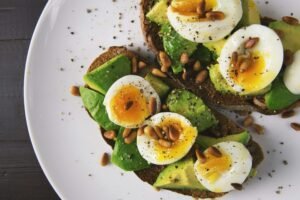
Image: pexels
Protein is one of the essential macronutrients for building muscle mass. It is made up of amino acids, which are the building blocks of muscles. When you exercise, your muscles experience microscopic tears, and protein helps to repair and rebuild those tears, making your muscles bigger and stronger.
Protein helps to increase muscle protein synthesis, which is the process by which your body builds new muscle tissue. This process requires an adequate amount of protein intake, as well as exercise. Without enough protein, your body won’t be able to build new muscle tissue, even if you’re working out regularly.
In addition to building muscle mass, protein is also important for overall health. It helps to maintain healthy skin, hair, and nails, as well as supporting a healthy immune system. Protein also helps to regulate blood sugar levels, keeping you feeling fuller for longer periods of time, and preventing cravings for unhealthy snacks.
Some of the best sources of protein for building muscle mass include lean meats such as chicken and turkey, fish such as salmon and tuna, eggs, nuts, and legumes such as beans and lentils. By incorporating these foods into your diet, you can ensure that you’re getting the protein your body needs to build muscle mass and support overall health.
3. The role of carbohydrates and healthy fats in muscle growth
When it comes to building muscle mass, most people tend to focus solely on protein, forgetting about the important role of carbohydrates and healthy fats in muscle growth. Carbohydrates are essential for providing energy to your body during intense workouts. When your glycogen stores are low, your body will start to break down muscle tissue to use as energy. Therefore, it is important to consume a sufficient amount of carbohydrates to fuel your workouts and prevent muscle breakdown.
Healthy fats are also crucial for muscle growth. They provide your body with a source of energy, help to maintain healthy hormone levels, and aid in nutrient absorption. Omega-3 fatty acids, found in fish and nuts, may also help to reduce inflammation, improve joint health and decrease recovery time.
When choosing carbohydrates and fats, it is important to choose nutrient-dense options. Opt for complex carbohydrates such as sweet potatoes, brown rice, and quinoa, which are high in fiber and provide sustained energy. Healthy fat sources include nuts, seeds, avocados, and fatty fish.
Remember, building muscle mass is not just about protein. A balanced diet that includes carbohydrates and healthy fats is essential for achieving your muscle growth goals.
4. Top 10 foods to build muscle mass, including:
Lean meats such as chicken, beef, and turkey are great sources of high-quality protein that is essential for building muscle mass. Protein is made up of amino acids, which are the building blocks of muscle tissue. In fact, protein is the most important nutrient for muscle growth and repair, as it helps to repair and rebuild muscle tissue that is damaged during exercise.
Eggs are another great source of protein, as they contain all nine essential amino acids. They are also rich in vitamins and minerals, such as vitamin D and choline, which are important for muscle function and recovery.
Fish, such as salmon and tuna, are also great sources of protein and omega-3 fatty acids, which help to reduce inflammation and improve muscle recovery.
Nuts and seeds, such as almonds, walnuts, and chia seeds, are rich in healthy fats and protein, making them a great snack for building muscle mass.
Greek yogurt is also a great source of protein, with one cup containing up to 23 grams of protein. It’s also a great source of calcium, which is important for muscle function.
Whole grains, such as brown rice and quinoa, are a great source of carbohydrates, which provide energy for your muscles during exercise. They are also rich in fiber, which helps to keep you feeling full and satisfied.
Beans and legumes, such as chickpeas and lentils, are a great source of plant-based protein and fiber. They are also low in fat and high in nutrients, making them a great addition to any muscle-building diet.
Milk is another great source of protein, with one cup containing up to 8 grams of protein. It’s also a great source of calcium, which is important for muscle function and recovery.
Lean red meat, such as beef and venison, is a great source of protein and iron, which is important for muscle function and recovery.
Finally, vegetables such as spinach, broccoli, and kale are rich in vitamins and minerals that are important for muscle function and recovery. They are also low in calories, making them a great addition to any muscle-building diet.
a. Lean meats such as chicken, turkey, and beef
Lean meats such as chicken, turkey, and beef are essential for building muscle mass. They are high in protein, which is the building block of muscle tissue. Protein is crucial for muscle repair and growth, and without it, your progress will be limited.
Chicken, in particular, is a great source of lean protein, and it is easy to prepare in a variety of ways. Grilled chicken breasts, for example, can be a staple in any muscle-building diet. Turkey is another great option, as it is low in fat and high in protein. Beef, especially lean cuts like sirloin and flank steak, is also an excellent source of protein and other essential nutrients like iron and zinc.
When choosing your meats, it’s important to choose lean cuts and avoid processed meats like sausages, hot dogs, and deli meats. These processed meats are often high in saturated fats and sodium, which can be detrimental to your overall health. Stick to lean, unprocessed meats for the best muscle-building results.
Incorporating lean meats into your diet can be easy and delicious. Try grilling chicken or turkey and pairing it with some roasted vegetables for a healthy and satisfying meal. You can also add lean ground beef to your favorite pasta dish or stir-fry for an extra protein boost. With these lean meats, you’ll be well on your way to building the muscle mass you desire.
b. Fish, including salmon and tuna
Fish is not only heart-healthy but also an excellent source of protein that can help build muscle mass. Salmon and tuna are packed with omega-3 fatty acids, which are essential for muscle growth and repair. These fatty acids are also responsible for reducing inflammation in the body, which can help prevent muscle soreness and damage.
Salmon and tuna are also rich in vitamin D, which is important for maintaining strong bones and muscles. In fact, research has shown that low levels of vitamin D can lead to muscle weakness and a higher risk of falls, particularly in older adults.
Furthermore, fish is a lean protein source, meaning it contains very little fat compared to other protein sources such as beef or pork. This makes it a great food to include in your diet if you’re trying to build muscle mass while also watching your calorie intake.
To reap the benefits of fish for muscle building, aim to include it in your diet at least twice a week. Try grilling or baking salmon or tuna fillets with some herbs and spices for a delicious and nutritious meal.
c. Eggs
Eggs are a great food for gaining muscle mass. These little powerhouses are packed full of protein, vitamins, minerals, and healthy fats that can help you build muscle, repair tissue, and recover from training sessions. They are a highly versatile food and can be consumed in many ways. From boiled to fried, eggs are a great way to add protein to your diet.
Eggs contain about 6 grams of high-quality protein per egg, which makes them a great food for muscle gain. They also contain all nine essential amino acids, which are the building blocks of protein. Eating enough protein is crucial for building muscle mass, and eggs are a great way to meet your daily protein intake.
In addition to being high in protein, eggs are also rich in vitamins and minerals. They contain vitamin D, which is essential for bone health, and they are a good source of vitamin B12, which is crucial for energy production. Eggs also contain choline, a nutrient that is important for brain health and cognitive function.
Overall, eggs are a great food to include in your muscle-building diet. They are affordable, versatile, and packed full of protein, vitamins, and minerals that can help you build muscle mass and improve overall health.
d. Greek yogurt
Greek yogurt is a delicious and highly nutritious food that’s perfect for building muscle mass. It’s packed full of protein, which is essential for muscle growth and repair, and also contains a range of other important nutrients such as calcium, vitamin D, and probiotics.
One cup of Greek yogurt contains around 23 grams of protein, which is almost twice as much as regular yogurt. This high protein content makes it a great choice for a post-workout snack, as it can help to repair and rebuild muscle tissue that’s been damaged during exercise.
Greek yogurt is also very versatile and can be used in a variety of different ways. You can enjoy it on its own, add it to smoothies, or use it as a healthy substitute for sour cream in recipes.
When choosing Greek yogurt, it’s important to opt for the plain variety rather than the flavored options which can be loaded with added sugars. You can add your own flavors by adding fresh fruit, honey or nuts to your taste. So next time you’re looking for a tasty and nutritious way to build muscle mass, give Greek yogurt a try!
e. Cottage cheese
Cottage cheese is a great addition to any muscle-building diet. This dairy product is high in casein protein, which is a slow-digesting protein that can help fuel muscle growth and recovery overnight. Cottage cheese is also low in fat and carbohydrates, making it an ideal food for those looking to build lean muscle mass. Additionally, cottage cheese is a good source of calcium, a mineral that is essential for healthy bones and muscle function.
One of the best things about cottage cheese is how versatile it is. You can eat it plain, mix it with fruit for a high-protein snack, or even use it as a substitute for higher-fat ingredients in recipes. For example, you can use cottage cheese in place of cream cheese in a cheesecake recipe for a healthier, protein-packed dessert. Cottage cheese can also be blended with protein powder and other ingredients to make a delicious, high-protein smoothie.
Incorporating cottage cheese into your diet is a simple and effective way to boost your muscle-building efforts. Try adding it to your meals and snacks for a convenient and nutritious source of protein.
f. Quinoa
When it comes to building muscle mass, most people tend to think of protein-rich foods such as chicken, beef, and fish. However, there are many other foods that are also great for building muscle and quinoa is one of them.
Quinoa is a versatile grain that is rich in protein, fiber, vitamins, and minerals. It is also gluten-free and has a low glycemic index, making it an excellent choice for people who want to build muscle without adding extra carbs to their diet.
One of the reasons quinoa is so great for building muscle is that it contains all nine essential amino acids that our bodies cannot produce on their own. Amino acids are the building blocks of protein, so consuming quinoa can help provide your body with the nutrients it needs to build and repair muscle tissue.
In addition to its muscle-building properties, quinoa is also great for overall health. It has been linked to lower cholesterol levels, improved digestion, and better blood sugar control. It can be enjoyed in a variety of ways, such as in salads, as a side dish, or even in place of rice or pasta.
So, if you’re looking to bulk up and build muscle, don’t forget to add quinoa to your diet. It’s a nutritious and delicious way to fuel your body and support your fitness goals.
g. Brown rice
Brown rice is a whole grain that is rich in complex carbohydrates and fiber. It is also a great source of plant-based protein, making it an ideal food for muscle building. Brown rice is a slow-digesting carbohydrate, meaning that it provides sustained energy to the body over a longer period of time, making it perfect for pre-workout meals. It is also rich in vitamins and minerals, such as magnesium, selenium, and phosphorus, which are essential for muscle growth and repair. Brown rice is also gluten-free, making it a great option for those with gluten sensitivities. To include brown rice in your muscle-building diet, you can add it to your meals as a side dish or mix it with other protein sources like chicken or fish to create a balanced and nutritious meal. It’s an affordable, easy-to-find food that can help you bulk up and achieve your muscle-building goals.
h. Sweet potatoes
Sweet potatoes are an excellent food choice for anyone looking to bulk up and build muscle mass. They are packed with complex carbohydrates, which provide a steady source of energy during workouts and help replenish glycogen stores in the muscles post-workout. Additionally, sweet potatoes are loaded with fiber, vitamins, and minerals, making them a nutritious addition to any muscle-building meal plan.
Studies have shown that consuming sweet potatoes can help enhance muscle recovery and prevent muscle damage. They are also rich in beta-carotene, which can help reduce inflammation in the body, making them a great choice for athletes who engage in high-intensity workouts.
Sweet potatoes are versatile and can be incorporated into a variety of meals, from roasted sweet potatoes as a side dish, to sweet potato fries as a snack, to sweet potato mash as a main course. They can even be used in smoothies for an added nutritional boost. Incorporating sweet potatoes into your diet is a delicious and effective way to help build muscle mass and support your fitness goals.
i. Nuts and seeds
Nuts and seeds are a fantastic source of protein, fiber, and healthy fats, making them a perfect addition to any muscle-building diet. Almonds, cashews, peanuts, sunflower seeds, and chia seeds, are just a few examples of nuts and seeds that can help you bulk up.
Not only do they provide your body with essential nutrients, but they also help to reduce inflammation and improve heart health. Additionally, nuts and seeds are very versatile and can be easily incorporated into your daily diet. You can add them to your morning oatmeal or yogurt, sprinkle them on your salad, or simply eat them as a snack.
One of the great things about nuts and seeds is that they are calorie-dense, which means that they provide a lot of energy in a small serving. This makes them an excellent choice for those looking to pack on muscle mass without having to eat large amounts of food.
However, it’s important to keep in mind that nuts and seeds are high in fat, so it’s important to consume them in moderation. A small handful of nuts or a tablespoon of seeds is all you need to reap the benefits without going overboard on calories.
Overall, nuts and seeds are a tasty and nutritious way to add more protein, healthy fats, and fiber to your diet, helping you to build muscle mass and achieve your fitness goals.
j. Green leafy vegetables
When it comes to building muscle mass, many people often overlook the importance of consuming green leafy vegetables. However, these nutrient-rich plants are packed full of vitamins and minerals that can aid in muscle growth and recovery.
Spinach, for example, is a great source of magnesium, a mineral that plays a key role in muscle contraction and relaxation. Another green leafy vegetable, kale, is high in vitamin K, which has been shown to improve bone health – a crucial aspect of building muscle mass.
Additionally, green leafy vegetables are often low in calories, making them a great addition to any diet plan focused on gaining muscle while avoiding excess weight gain. They are also high in fiber, which can help with digestion and prevent bloating or other digestive issues that may hinder workouts.
But don’t just stick to spinach and kale – try branching out and incorporating other green leafy vegetables into your diet as well. Swiss chard, collard greens, and arugula are all great options that can provide a variety of muscle-building nutrients. So next time you’re at the grocery store, be sure to stock up on some green leafy veggies for your muscle-building journey.
5. Tips for incorporating these foods into your diet in a healthy way
Incorporating these foods into your diet in a healthy way is essential to ensure you gain muscle mass effectively and maintain a healthy body. Here are some tips to help you incorporate these foods into your diet:
1. Plan your meals ahead of time: Planning your meals ahead of time can help you ensure that you are consuming these muscle-building foods in the right amounts.
2. Portion control: While these foods are healthy, overeating can lead to an increase in body fat. Therefore, it’s important to practice portion control when incorporating these foods into your diet.
3. Combine with other nutrients: Combining these foods with other nutrients such as carbohydrates and healthy fats can help your body absorb the nutrients more effectively.
4. Choose healthy cooking methods: Instead of frying or deep-frying these foods, opt for healthier cooking methods such as grilling, baking, or steaming.
5. Stay hydrated: Drinking plenty of water throughout the day is important for muscle growth and overall health.
6. Consult a nutritionist: If you’re unsure about how to incorporate these foods into your diet, consider consulting a nutritionist who can create a plan tailored to your specific needs.
By following these tips, you can incorporate these muscle-building foods into your diet in a healthy way, helping you achieve your fitness goals and maintain a healthy body.
6. The importance of hydration in building muscle mass
When it comes to building muscle mass, many people focus heavily on their diet and exercise regimen, but often overlook the importance of proper hydration. Adequate hydration is crucial for building muscle mass as it helps to transport nutrients to the muscles, remove waste products, and regulate body temperature.
Water is the best choice for hydration and it is recommended to drink at least eight 8-ounce glasses of water per day. However, if you are engaging in intense workouts or live in a hot climate, you may need to increase your water intake to ensure you stay properly hydrated.
In addition to water, electrolytes are also important for hydration. Electrolytes are minerals such as sodium, potassium, and magnesium that help to regulate fluid balance in the body. You can get electrolytes from sports drinks or natural sources like coconut water.
It’s important to note that sugary drinks like soda or fruit juice should be avoided as they can dehydrate you and add unnecessary calories to your diet. Alcohol is also dehydrating and can interfere with your ability to build muscle mass.
In summary, proper hydration is essential for building muscle mass. Aim to drink at least eight glasses of water per day and consider adding electrolytes to your routine if you are engaging in intense workouts or live in a hot climate. Avoid sugary drinks and alcohol, as they can dehydrate you and hinder your progress in building muscle mass.
7. Meal planning for muscle growth
Meal planning is an essential part of building muscle mass. You can work out all you want, but if you’re not fueling your body with the right nutrients, you won’t see the results you’re looking for. It’s important to consume a balanced diet that includes carbohydrates, protein, and healthy fats in the right proportions.
When planning your meals, aim for a mix of complex carbohydrates like brown rice and sweet potatoes, lean protein sources such as chicken breast and fish, and healthy fats like avocado and nuts. Eating several small meals throughout the day can also help keep your metabolism active and provide your body with a steady stream of nutrients.
In addition to planning your meals, it’s important to stay hydrated. Water is essential for muscle growth and recovery, as it helps transport nutrients to your muscles and removes waste products.
Lastly, don’t forget to fuel up before and after your workouts. Eating a small meal or snack containing carbohydrates and protein before your workout can help provide energy and prevent muscle breakdown. After your workout, aim to eat a meal or snack that includes protein and carbohydrates to help repair and rebuild your muscles. With the right meal planning, you’ll be on your way to building muscle mass in no time.
8. Other supplements or foods to consider adding to your diet for muscle growth
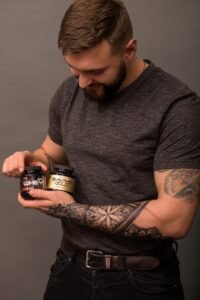
Image: pexels
There are several other supplements and foods that can be added to your diet to complement your muscle-building goals.
One of them is creatine, which is a naturally occurring substance found in muscle cells. It is known to increase muscle mass, strength, and exercise performance. Creatine supplements are readily available and can be taken as part of your daily regimen.
Protein shakes are another popular supplement that can help you meet your daily protein requirements. Whey protein is an excellent source of protein that is easily absorbed by the body, making it a great option for post-workout recovery.
Eggs are also an excellent food to add to your muscle-building diet. They are a great source of high-quality protein, vitamins, and minerals. In fact, the protein found in eggs is considered one of the most complete and easily absorbed proteins available.
Other foods to consider adding to your diet include lean meats like chicken and turkey, fish like salmon and tuna, nuts and seeds, quinoa, and beans. These foods are high in protein, healthy fats, and carbohydrates that can help fuel your workouts and aid in muscle growth.
It’s important to remember that supplements and foods are meant to complement a healthy diet and exercise regimen. Always consult with a healthcare professional before adding any new supplements or making significant changes to your diet.
9. Common mistakes to avoid when trying to build muscle mass through diet
When it comes to building muscle mass, diet plays a crucial role in achieving your goals. However, there are common mistakes that many people make that can hinder their progress. One such mistake is not consuming enough calories. In order to build muscle, you need to be consuming more calories than you burn, otherwise, your body won’t have the energy to support muscle growth.
Another mistake is not getting enough protein. Protein is essential for building and repairing muscles, and if you’re not getting enough, your muscles won’t grow as efficiently. Aim for at least 1 gram of protein per pound of bodyweight per day.
It’s also important to avoid cutting out entire food groups or drastically reducing your carbohydrate intake. Carbohydrates provide your body with energy and are important for fueling workouts and building muscle. However, it’s important to choose complex carbohydrates such as whole grains, sweet potatoes, and fruits and vegetables over refined carbohydrates like white bread and sugary snacks.
Finally, don’t forget to stay hydrated. Adequate hydration is necessary for muscle function and can also improve exercise performance. Aim for at least 8-10 glasses of water per day and more if you’re exercising vigorously. By avoiding these common mistakes, you’ll be well on your way to building muscle mass through diet.
10. Conclusion and encouragement to start incorporating these foods into your diet for muscle growth.
In conclusion, building muscle mass requires a combination of consistent exercise and a healthy diet that includes foods that are high in protein, healthy fats, and complex carbohydrates. By incorporating these top 10 foods into your diet, you can ensure that your body is getting the essential nutrients it needs to build muscle and recover properly.
Don’t be discouraged if you don’t see results immediately. Building muscle takes time and dedication, but with a proper diet and exercise routine, you can achieve your goals.
Remember to consult with a healthcare professional and a certified nutritionist before making any significant changes to your diet, especially if you have any preexisting health conditions.
So start incorporating these muscle-building foods into your diet today and watch your body transform as you become stronger, healthier, and more confident in your abilities. With hard work, dedication, and the right fuel, you can achieve your muscle-building goals and take your fitness to the next level!
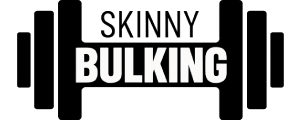


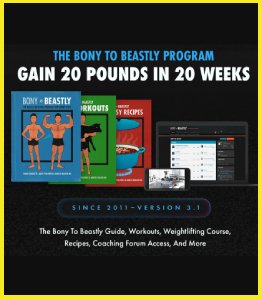


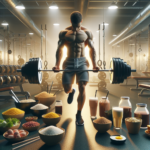
Leave a Reply